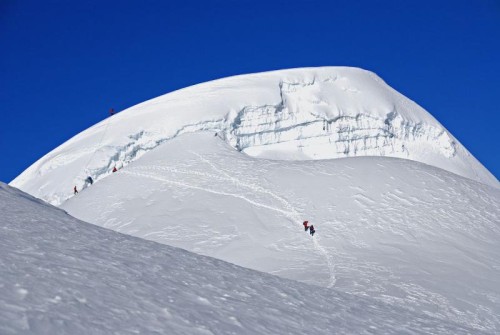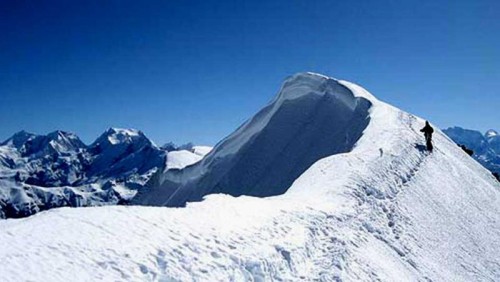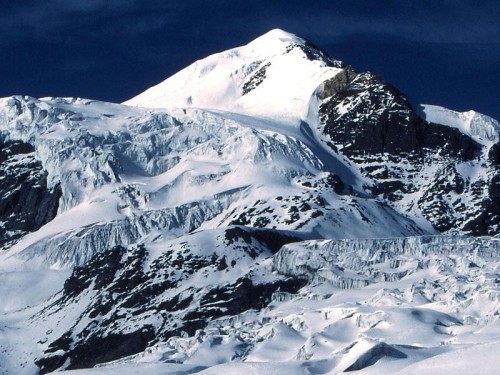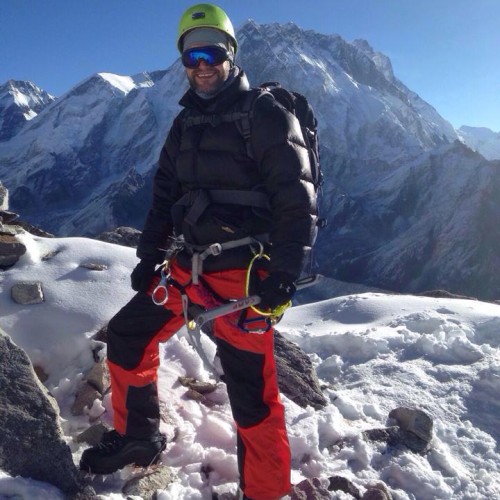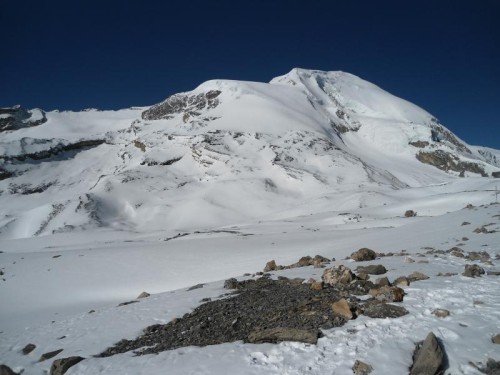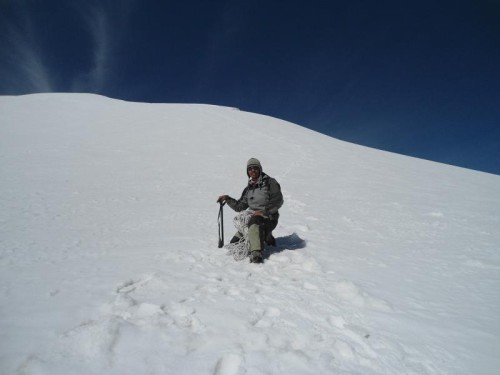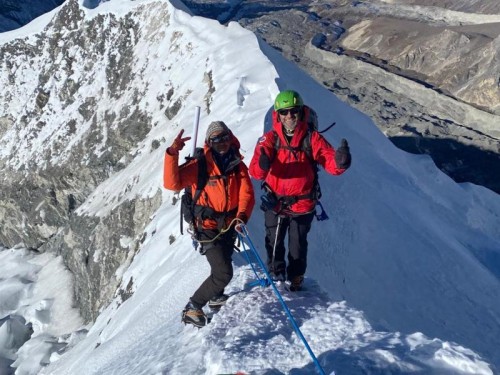Peak Climbing In Nepal
Peak Climbing in Nepal offers adventurous people the opportunity to climb smaller peaks in the Nepal Himalayas, combining trekking and basic climbing skills. Nepal is home to numerous trekking peaks that offer a variety of peaks suitable for climbers of different skill levels, relatively easy to more technically challenging climb peaks.
Peak Climbing in Nepal Having eight of the highest peaks in the world, it is no doubt that Nepal counts as one of the best destinations for peak climbing and mountaineering in the world. Among 1,310 identified peaks over 6,000 m, one quarter has been legally opened for mountaineering and climbing activities which are also known as “Trekking Peaks”. The majorities of the peaks in Nepal are less technical, reaching base camps in a few days of walking, and can be summited by physically fit climbers. Nepal has immersed itself as an ideal destination for climbing after the first ascent of the highest peak, Mount Everest in 1953. Nepal offers a variety of alternatives for peak climbing in Nepal from an easy level to hard level difficulty as thirty-three peaks scaling from 5,587 m (Mardi Himal) to 6,665 m (Others Peak) are permitted for climbing by Nepal Mountaineering Association (NMA). Peaks below 6,500 m are initiatory steps for climbers who intend for a summit course afterward. Prior mountaineering experience and physical and mental determination are required for climbing these peaks.
Besides adventurous treks, Peak Climbing in Nepal offers stunning panoramic Himalayan landscapes, age-old alpines, monasteries, cultural insight of the Sherpa tribe, and great walks through varied terrains of the protected areas. Crampon walk over a snowy path, treading on the glacial trail, camping over the lap of lofty peaks, and riveting rope skills are the main attractions of Peak Climbing in Nepal. High Pass Adventure Company operates peak climbing, and expeditions to all peaks in Nepal for a few days to many days taking climbing. We offer an incredible climbing experience that is technically safe and guided under the direct supervision of veteran Sherpa (experience) Climbers. Climbing these peaks is introductory trekking before going beyond or scaling eight thousandths.
What is Peak Climbing in Nepal?
Peak climbing is the activity of ascending smaller; Non-expedition Mountains that often require basic technical climbing skills and equipment. Peak climbing in Nepal involves ascending the country's 'trekking peaks' — mountains typically ranging between 5,500 and 6,500 meters — which combine high-altitude trekking with basic mountaineering. In simple terms, it means trekking enhanced with some technical climbing, requiring the use of ropes, crampons, ice axes, climbing boots, helmets, and harnesses. This adventure activity demands good health, technical skills, physical fitness, and strong determination. It is ideal for trekkers seeking a greater challenge and thrill without committing to full-scale mountaineering expeditions above 6,500 meters. Peak climbing offers the incredible reward of standing on a Himalayan summit, surrounded by some of the world’s most iconic peaks.
Trekking peaks in Nepal are regulated by either the Nepal Mountaineering Association (NMA) or the Department of Tourism. Each climbing peak has a different royalty fee depending on its height and the season. A total of 33 peaks below 6,500 meters are managed by the NMA, including popular ones such as Island Peak (6,189 m), Mera Peak (6,476 m), Lobuche East (6,119 m), among others.
In Nepal, there are peaks with altitudes below 5,800 meters. As per the decision made by the Ministry of Culture, Tourism, and Civil Aviation, the royalty fee for these peaks has been waived. Therefore, the following six peaks permitted by the Nepal Mountaineering Association (NMA) are exempt from royalty fees:
- Yala Peak (5,732m)
- Chhukung Ri (5,550m)
- Tharpu Chuli/Tent Peak (5,663m)
- Mardi Himal (5,587m)
- Machhermo (5,559m)
- Pokhalde (5,780m)
Why Nepal is famous for Peak Climbing?
- Himalayan Majesty: Nepal is home to some of the world's highest and most iconic mountains, including Mount Everest, which naturally makes it a main destination for climbers and mountaineers. The Himalayan range offers stunning scenery for peak climbing, with its breathtaking landscapes and challenging peaks.
- Variety of Peaks: Nepal offers a wide range of peaks suitable for climbers of all skill levels. From relatively accessible "trekking peaks" to more technically challenging high-altitude summits, there's something for everyone. This variety attracts both beginners and experienced climbers looking for new challenges.
- Some of the popular trekking peaks for climbing in Nepal include Island Peak (Imja Tse), Mera Peak, Lobuche East Peak, and Pisang Peak, Tent Peak, Yalla Peak among others.
- Adventure and Challenge: Peak climbing in Nepal combines the excitement of mountaineering with the adventure of trekking. Climbers get to test their physical and mental limits while also enjoying the thrill of successful summits, making it a truly rewarding adventure.
- Accessible Base Camps: Many of Nepal's peak climbing routes start from well-established trekking trails, with base camps often accessible by relatively moderate trekking. This means climbers can gradually acclimatize to the altitude, reducing the risk of altitude sickness and increasing the chances of a successful summit.
- Supportive Infrastructure: Nepal has a physically powerful trekking and climbing infrastructure. There are experienced local guides, porters, and climbing companies that provide logistical support, equipment, and guidance for climbers, ensuring a safer and more organized experience.
- Sense of Achievement: Climbing a peak in Nepal, even one of the "trekking peaks," provides a sense of accomplishment that few other experiences can match. Standing on a summit in the heart of the Himalayas is a moment of personal victory and expression.
- Natural Beauty: The landscapes surrounding Nepal's climbing peaks are truly mesmerizing, ranging from lush valleys and rhododendron forests to high-altitude deserts and glaciated terrain. The opportunity to witness these diverse environments is a major draw for climbers.
Which peak is most popular for climbing in Nepal?
Island Peak (6,189m) is the most popular climbing peak in Nepal due to its easy accessibility from lodges. Only one night is spent in a tent camp, and the climbing route is typically prepared with fixed ropes, making it easier to climb. The route starts from Lukla and follows the Everest Base Camp trail, making it logistically simple, and Island Peak climbing can be combined with the Everest Base Camp Trek.
This peak is ideal for both beginners and experienced climbers, making it perfect for those looking to climb their first 6,000m peak. Island Peak also offers stunning Himalayan views, with breathtaking panoramas of Everest, Lhotse, Ama Dablam, Makalu and surrounding mountains.
The climbing level is moderate technical difficulty, requiring basic mountaineering skills such as using an ice axe, crampons, and ropes.
Best time for Peak Climbing in Nepal
Traveling to Nepal is good for all seasons but the best time for peak climbing in Nepal usually falls within two main seasons: spring and autumn. These seasons offer the most favorable weather conditions, stable temperatures, and clear views, making them perfect for peak climbing and mountaineering activities. The detailed seasons to consider are:
Spring (March to May):
Spring is considered the main season for peak climbing in Nepal. During this time, the weather starts to warm up, and the snow and ice conditions become more stable. The days are longer, providing sufficient daylight for climbing activities. The skies are usually clear, offering stunning panoramic views of the surrounding landscapes. This is a popular time for climbers to attempt various peaks, including both trekking peaks and Mountain summits.
Autumn (September to November):
Autumn is another excellent time for peak climbing in Nepal. After the monsoon season, the skies become clear, and the air is crisp. The temperatures are moderate, and the trails are relatively dry. Climbers can enjoy excellent visibility and stunning vistas, which makes this season mostly attractive for both trekking and mountaineering activities.
Both spring and autumn offer moderately stable weather patterns and good climbing conditions, making them the preferred seasons for peak climbing. However, it's necessary to keep in mind that altitude, weather, and climbing conditions can differ from peak to peak. It's advisable to consult with local climbing operators, experienced guides, and weather forecasts before planning your climbing and expedition.
While spring and autumn are the main climbing seasons, some climbers also attempt peak climbs during the winter and summer months. Winter (December to February) can be extremely cold at higher elevations, and snow and ice conditions can be more challenging. Summer (June to August) is the monsoon season, characterized by heavy rainfall and cloudy skies, which can make climbing more difficult and risky due to slippery trails and reduced visibility.
If you're planning a peak climbing in Nepal, plan for either the spring (March to May) or autumn (September to November) seasons to maximize your chances of a successful and enjoyable climbing experience. These seasons are also the best time for Trekking in Nepal.
Highlights of Peak Climbing in Nepal
- Wide Range of Climbing Peaks: Nepal offers a diverse range of peaks suitable for various climbing skill levels. From trekking peaks to challenging technical climbs, there's something for everyone for outdoor adventure.
- Adventure and Challenging Climbing Peaks: Peak Climbing in Nepal is a true adventure, with challenges ranging from high altitudes to technical ice and rock climbing. It requires physical fitness, mental strength, and technical skills.
- Climbing Routes are Accessibility: Nepal's climbing peaks are relatively more accessible like Island Peak, Lobuche Peak, Mera Peak, Larke Peak, Throng Peak, etc making them suitable for both novice and experienced climbers.
- Nepal’s Peak climbing offers nature beauty: During the peak climbing, offering a mix of beautiful landscapes, diverse flora, and fauna.
- Providing the Stunning Views: Climbers are rewarded with breathtaking panoramic views from the summits, including views of the surrounding peaks, valleys, and, on some climbs, even glimpses of Mount Everest, Manaslu and Annapurna.
Royalty structure for Foreign Climber per person in US dollar
Group 'A'
| |
Cost/
Season→
|
Spring
|
Autumn
|
Winter
|
Summer
|
|
SN
|
Name of the peak
|
Region
|
Height
|
March/April/May
|
Sept/Oct/Nov
|
Dec/Jan/Feb
|
June/July/August
|
|
1
|
Mt Cholatse
|
Everest Region
|
6,335m
|
USD250
|
USD125
|
USD70
|
USD 70
|
|
2
|
Mt. Kyazo Ri
|
Everest Region
|
6,186m
|
USD250
|
USD125
|
USD70
|
USD70
|
|
3
|
Mt. Nirekha
|
Everest Region
|
6149m
|
USD 250
|
USD 125
|
USD 70
|
USD 70
|
|
4
|
Mt. Langsisa Ri
|
Langtang Region
|
6412m
|
USD 250
|
USD 125
|
USD 70
|
USD 70
|
|
5
|
Mt. Lobuche West
|
Everest Region
|
6145m
|
USD 250
|
USD 125
|
USD 70
|
USD 70
|
|
6
|
Mt. Larkya Peak
|
Manaslu Region
|
6416m
|
USD 250
|
USD 125
|
USD 70
|
USD 70
|
|
7
|
Mt. Yubra Himal
|
Langtang Region
|
6048m
|
USD 250
|
USD 125
|
USD 70
|
USD 70
|
|
8
|
Mt. Thorong Peak
|
Annapurna Region
|
6426m
|
USD 250
|
USD 125
|
USD 70
|
USD 70
|
|
Group “B”
|
Cost/
Season→
|
Spring
|
Autumn
|
Winter
|
Summer
|
|
SN
|
Name of the peak
|
Region
|
Height↓
|
March/April
May
|
Sept/Oct/
Nov
|
Dec/Jan/
Feb
|
June/July/
August
|
|
1
|
Hiunchuli
|
Annapurna Region
|
6434m
|
USD250
|
USD125
|
USD70
|
USD 70
|
|
2
|
Singu Chuli (Fluted Peak)
|
Annapurna Region
|
6501m
|
USD400
|
USD200
|
USD100
|
USD100
|
|
3
|
Mera Peak
|
Everest Region
|
6461m
|
USD250
|
USD125
|
USD70
|
USD 70
|
|
4
|
Kusum Kangru
|
Everest Region
|
6367m
|
USD250
|
USD125
|
USD70
|
USD 70
|
|
5
|
Kwangde
|
Everest Region
|
6093m
|
USD250
|
USD125
|
USD70
|
USD 70
|
|
6
|
Chulu West
|
Annapurna Region
|
6419m
|
USD250
|
USD125
|
USD70
|
USD 70
|
|
7
|
Chulu East
|
Annapurna Region
|
6584m
|
USD400
|
USD200
|
USD100
|
USD100
|
|
8
|
Imja Tse (Island Peak)
|
Everest Region
|
6189m
|
USD250
|
USD125
|
USD70
|
USD 70
|
|
9
|
Pharchamo
|
Rolwaling Himal
|
6279m
|
USD250
|
USD125
|
USD70
|
USD 70
|
|
10
|
Lobuche East
|
Everest Region
|
6091m
|
USD250
|
USD125
|
USD70
|
USD 70
|
|
11
|
Ramdung-go
|
Rolwaling Himal
|
5900m
|
USD250
|
USD125
|
USD70
|
USD 70
|
|
12
|
Pisang Peak
|
Annapurna Region
|
6091m
|
USD250
|
USD125
|
USD70
|
USD 70
|
|
13
|
Khongma Tse (Mehra Peak)
|
Everest Region
|
5849m
|
USD250
|
USD125
|
USD70
|
USD 70
|
|
14
|
Paldor Peak
|
Langtang Region
|
5903m
|
USD250
|
USD125
|
USD70
|
USD 70
|
|
15
|
Ganja La Chuli (Naya Kanga)
|
Langtang Region
|
5863m
|
USD250
|
USD125
|
USD70
|
USD 70
|



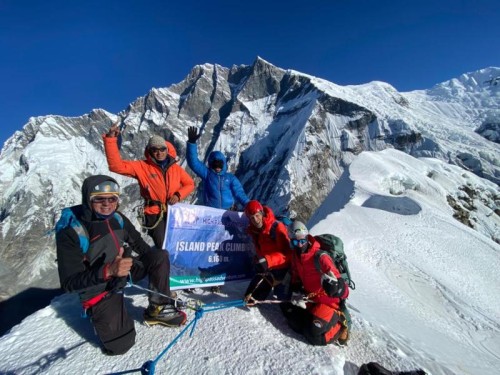
 Nepal , Peak Climbing In Nepal
Nepal , Peak Climbing In Nepal 

 USD 2250
USD 2250